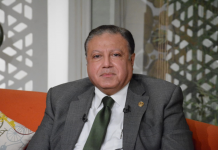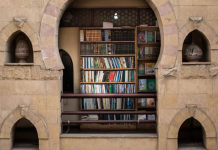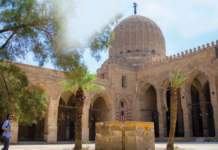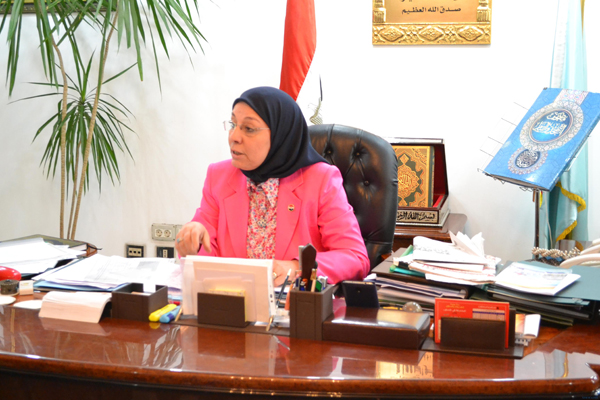Egypt’s Minister of Planning talks to The Middle East Observer
Interview by: Mohamed Naguib
Dr Ashraf Al-Arabi, the minister of planning, follow-up and administrative reform, has revealed that the transformation of economic growth on the ground in the form of jobs would require a variety of projects approximately over five to10 years before Egyptians can experience a marked rise in average income and standards of living.
Arabi confirmed that a new wage structure would raise the basic pension by 60 per cent, together with staff promotion every three years and training programmes in agreement with the European Union. Introducing centralised computer tests for new posts will eliminate favouritism.
The Middle East Observer met the minister to discuss many of the issues that concern Egyptians today.
How do you see the state administration entity? Is there a plan to develop it?
- I am not satisfied with the state administration performance, and the problem lies in its efficiency and effectiveness. We must now complete what has been built on previously. A committee for administrative reform has been formed and is meeting weekly to look at appropriate international experience and the possibility of adaptating them to the current circumstances, and to set a plan for the reform of the administrative performance within a certain time frame.
We have 6.4 million employees in the proportion of up to one employee for 13 people, but a million of them work in the care services and they are important. However, we find that maintenance, cleaning and such jobs are being neglected in the administrative system, and we have an inverted structure in the government: there are more leadership jobs in some places than jobs of a lesser degree, and we need to address this distortion. The promotion scheme to rise from the third degree to the second is currently about eight years, and then it takes another six years to climb to the first degree and four years to reach the levels that qualify for Law No 5. The new law would give opportunities for advancement every two or three years.
There are also reward and punishment mechanisms, like secret reports, in the government, through which staff obtain privileges that have led to the deformation of the system as a whole. Wages suffer a significant distortion in the structure, where 20 per cent are fixed and the rest variable, while the new law suggests 50 to 60 per cent on a fixed wage. This will address this distortion. The amendment will restructure wages, leading to satisfaction for employees. We are trying the new insurance law to adjust the employer’s insurance rate and solve the problem, and lead to higher pensions. There will be a central exam by computer that will not require any human intervention, and the result will appear on the computer after the completion of the exam. This is directly aimed at eliminating mediation and favoritism.
Why was planning linked to administrative reform in this government?
- Linking planning to administrative reform came about because we are targeting new building, and we must build a political reform parallel with economic reform. All plans will be implemented through the state administration system. On the follow-up side, Egypt does not lack plans and strategies. Take, for example, Egypt’s 2017 strategy prepared by Dr Kamal Ganzouri and the 2020 strategy prepared by Dr Ismail Sabri Abdullah. The Cabinet Information Centre and the Centre for Future Studies have drawn up Egypt’s 2030 strategy, and the urban communities and urban planning institute have produced strategies for 2050 and 2052, all on a national level.
What are the main features of the control and follow-up operations in the current plan?
- An integrated system for the preparation and follow-up of the economic and social development plans, which include the investment plan in the current budget of about LE131bn in public investments and LE6bn in government investment. This is divided into more than 6,000 projects including drinking water, transport, electricity, education, health, youth sports and endowments. An electronic follow-up system has been completed, and this will reduce those operations needing a hard copy in the work cycle.
When can the programme budget be clearly managed?
- We are currently in the process of linking up with the Ministry of Finance to gain access to the programme budget. For example, there are hospitals that have been built but do not function, and there are other problems as well. As for the development of the Sinai National Project, which began in 1997 and aimed at the resettlement of five million people by 2017, this did not work and we only managed to rehouse about half a million Sinai residents. Then in Toshka, where we are targeting the resettlement of 450,000, currently fewer than 30,000 people have new homes. There is political support for the system, and with that and ongoing training the efficiency of public spending will rise.
Do you have any plans to overcome corruption in the state administrative system?
- We are striving through the automation of government services to eliminate corruption, because whenever we separate the service provider from its seeker, corruption is reduced.
How can you ensure staff commitment to the state administrative system and the new law?
- A work statement will be required by law to be signed by every employee, which will determine their obligations throughout the period of work. Also we have begun to develop a training programme plan for employees in line with German aid for a number of programmes to convert personnel affairs departments in all government institutes to an HR department that will provide training and preparation of employees by means of various training courses.
To what extent has the Egyptian economy succeeded in overcoming the collapse of the past four years?
- In general the situation is now better. There have been improvements in the investment climate and legislative environment, and in investment laws that have addressed many of the obstacles facing investors. There is a clear vision for the various crises in energy through a tariff law for electricity, which is opening the way towards new and renewable energy.
How can lost confidence among investors be restored in the years to come?
- As I said, the government has introduced a number of investment law reforms and taken some decisions to make reforms at all levels within the sustainable development plan of 2030. Reforms have been on monetary and fiscal policy investment and legislation. We also have Law No. 47, which represents an administrative revolution and a serious attempt to achieve an administrative reform process and fight corruption and bureaucracy, which is one of the main impediments to investment in Egypt.
When should Egyptians see a breakthrough in the economy?
- We need to achieve sustained economic growth for almost five to 10 years until Egyptians feel better about the standard of living. Development needs perseverance, continuity and a strong political vision.
When will we experience real economic growth?
- Despite all the efforts to achieve high growth rates, we will still not achieve the desired development owing to the steady growth in population. So the government is drafting a new national integrated strategy for the population to ensure the allocation of financial resources along with economic growth.
How do you foresee the unemployment index in the coming period?
- The unemployment index has fallen from 4.13 to 1.13 per cent, and the continuation of the current major projects will lead to a reduction in unemployment by a large margin. There are several major national projects such as the new Suez Canal, roads, and a million acres and 240,000 social housing units, in addition to initiatives that have recently been launched.
What is the government’s plan to eliminate poverty?
- There is a generally accepted mechanism in all countries of the world known as the poverty map, the work of geo-targeting areas of the poor. There are places in Upper Egypt and rural areas that are identified for a poverty analysis. There are many causes of poverty, such as health and sanitation and poor roads. We must first repair these problems before development can begin.
Several major national projects have been put forward. Where is the spending coming from?
- There are major challenges because the country was semi stationary for the past several years, and there are high expectations and people have high hopes in the president. There is a new case we want to put forward for Egypt, for example the new Suez Canal. Funding is going well and it will open in August as scheduled. As for the investment area around the Suez Canal, the important thing is to prepare a comprehensive plan and promotion for private national, Arab and foreign investment.
What is new about the Toshka project?
- The current situation shows that the government has spent millions on infrastructure in Toshka, and so the water in the area there cannot be used solely for that region. The question arises: to complete of the project or not? The problem there is the lack of life for people in Toshka such as housing or schools, and so we will now provide all of that. Social housing units are being put in place by the Ministry of Housing and roadworks will be implemented.
What is the relationship between Egypt and the International Monetary Fund and World Bank?
- Egypt was one of the founders of the International Monetary Fund and pays a contribution to the IMF and the World Bank, and all the international financial institutions. Egypt has obligations, and in return there are some rights. Egypt must benefit from these institutions, like it or not, and whether we agree or refuse. Reports coming out of the IMF say they and all these institutions have incredible goals. Egypt is a member and thus we try to influence the decisions that are taken. Now we have Dr. Hazem Beblawi, the former prime minister, working at the IMF, and so Egypt has its representative in the decision-making on a world level.
What about the project to plant a million acres?
- The first phase of the one million acres project has been identified: the location and usage patterns some companies will establish. Now are digging wells because 90 per cent of the million acres are on land reclaimed from groundwater.
What about investing in the energy field?
- Power is one of the most important projects that we have been working on. We want to open the door for the private sector in new and renewable energy, and this means seeing clearly through the law and the tariff rates predetermined for the purchase of energy, which is encouraging investors.
What about the health and education sectors in the coming period?
- The Constitution states that spending on health, education and scientific research should not be less than 10 per cent of GNP, and by the year 2016/2017 we will reach that target of 10 per cent. This will double what was previously spent in these sectors.
Finally .. Is there a role for the private sector to invest in the health sector?
- Of course. Our proposal is to open closed health units which have no doctors and convert them into clinics so as to benefit the units and staff.
















